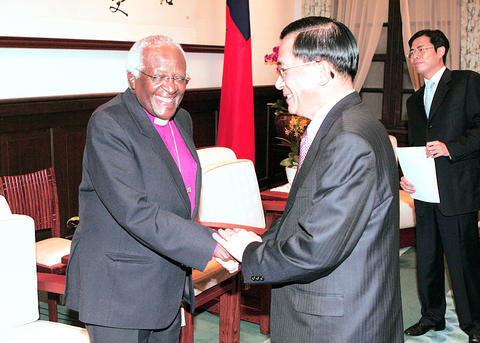True repentance and acknowledgement of mistakes is the key to reconciliation and forgiveness, but it is a long journey, Desmond Tutu, Nobel Peace laureate and former Anglican archbishop of South Africa, said yesterday.
In a symposium on "transitional justice and fusion of national ethnicities" hosted by the Taiwan Foundation for Democracy, Tutu shared South Africa's experiences with reconciliation and healing after the end of apartheid.
Tutu, who arrived in Taipei last Tuesday, said that he had witnessed the efforts of Taiwanese to emerge from the shadow of the nation's past. He praised the tolerance of the nation's political victims in their struggle for justice.

PHOTO: WALLY SANTANA, AP
"We bring a humble mind to Taiwan and share our experiences to you. Some of the experiences might be useful to Taiwan but it is up to you to decide what suits Taiwan," Tutu said.
"An eye for an eye will make all the people blind," he said, adding that reconciliation is a long journey.
"We must learn how to forgive," he said.
Tutu also talked about his meeting with former Democratic Progressive Party (DPP) chairman Lin I-hsiung (
Tutu said it was tragic that the Lin murders remained unsolved.
Tutu emphasized the importance of taking positive steps toward transitional justice, instead of feeling lost in sorrow and anger.
In South Africa, some people insisted on arresting perpetrators and bringing them to trial, following the pattern of the Nuremberg trials after World War II. Tutu said, however, that this method was unproven in helping a nation heal.
"It is a too heavy burden to the judiciary system and the police knows how to eliminate evidence. Besides, the legal process is so long that [it] turns the media chilly to the victims. A court is a very emotionless place," Tutu said.
After the end of apartheid in 1994, the government announced an amnesty for those who committed certain crimes under the apartheid era, provided that the perpetrators admitted their crimes.
Although the deal was criticized as being too easy on violators of human rights, confessing their crimes proved very difficult, Tutu said.
"Making a confession in public is actually a big punishment. It is not a traditional way of punishment," Tutu said.
He also encouraged victims and their families to tell their stories because they could be very good lessons for society to learn about the price they paid in their struggle for freedom.

Alain Robert, known as the "French Spider-Man," praised Alex Honnold as exceptionally well-prepared after the US climber completed a free solo ascent of Taipei 101 yesterday. Robert said Honnold's ascent of the 508m-tall skyscraper in just more than one-and-a-half hours without using safety ropes or equipment was a remarkable achievement. "This is my life," he said in an interview conducted in French, adding that he liked the feeling of being "on the edge of danger." The 63-year-old Frenchman climbed Taipei 101 using ropes in December 2004, taking about four hours to reach the top. On a one-to-10 scale of difficulty, Robert said Taipei 101

A preclearance service to facilitate entry for people traveling to select airports in Japan would be available from Thursday next week to Feb. 25 at Taiwan Taoyuan International Airport, Taoyuan International Airport Corp (TIAC) said on Tuesday. The service was first made available to Taiwanese travelers throughout the winter vacation of 2024 and during the Lunar New Year holiday. In addition to flights to the Japanese cities of Hakodate, Asahikawa, Akita, Sendai, Niigata, Okayama, Takamatsu, Kumamoto and Kagoshima, the service would be available to travelers to Kobe and Oita. The service can be accessed by passengers of 15 flight routes operated by

Taiwanese and US defense groups are collaborating to introduce deployable, semi-autonomous manufacturing systems for drones and components in a boost to the nation’s supply chain resilience. Taiwan’s G-Tech Optroelectronics Corp subsidiary GTOC and the US’ Aerkomm Inc on Friday announced an agreement with fellow US-based Firestorm Lab to adopt the latter’s xCell, a technology featuring 3D printers fitted in 6.1m container units. The systems enable aerial platforms and parts to be produced in high volumes from dispersed nodes capable of rapid redeployment, to minimize the risk of enemy strikes and to meet field requirements, they said. Firestorm chief technology officer Ian Muceus said

MORE FALL: An investigation into one of Xi’s key cronies, part of a broader ‘anti-corruption’ drive, indicates that he might have a deep distrust in the military, an expert said China’s latest military purge underscores systemic risks in its shift from collective leadership to sole rule under Chinese President Xi Jinping (習近平), and could disrupt its chain of command and military capabilities, a national security official said yesterday. If decisionmaking within the Chinese Communist Party has become “irrational” under one-man rule, the Taiwan Strait and the regional situation must be approached with extreme caution, given unforeseen risks, they added. The anonymous official made the remarks as China’s Central Military Commission Vice Chairman Zhang Youxia (張又俠) and Joint Staff Department Chief of Staff Liu Zhenli (劉振立) were reportedly being investigated for suspected “serious